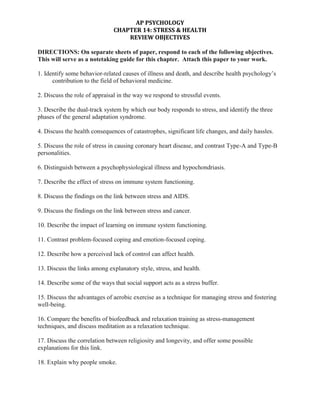
Chapter 14 review qs
- 1. DIRECTIONS: On separate sheets of paper, respond to each of the following objectives. This will serve as a notetaking guide for this chapter. Attach this paper to your work. <br />1. Identify some behavior-related causes of illness and death, and describe health psychology’s contribution to the field of behavioral medicine.<br />2. Discuss the role of appraisal in the way we respond to stressful events.<br />3. Describe the dual-track system by which our body responds to stress, and identify the three phases of the general adaptation syndrome.<br />4. Discuss the health consequences of catastrophes, significant life changes, and daily hassles. <br />5. Discuss the role of stress in causing coronary heart disease, and contrast Type-A and Type-B personalities. <br />6. Distinguish between a psychophysiological illness and hypochondriasis. <br />7. Describe the effect of stress on immune system functioning. <br />8. Discuss the findings on the link between stress and AIDS. <br />9. Discuss the findings on the link between stress and cancer.<br />10. Describe the impact of learning on immune system functioning.<br />11. Contrast problem-focused coping and emotion-focused coping.<br />12. Describe how a perceived lack of control can affect health.<br />13. Discuss the links among explanatory style, stress, and health.<br />14. Describe some of the ways that social support acts as a stress buffer.<br />15. Discuss the advantages of aerobic exercise as a technique for managing stress and fostering well-being.<br />16. Compare the benefits of biofeedback and relaxation training as stress-management techniques, and discuss meditation as a relaxation technique.<br />17. Discuss the correlation between religiosity and longevity, and offer some possible explanations for this link. <br />18. Explain why people smoke. <br />19. Discuss ways of helping smokers to quit smoking—or preventing young people from ever starting. <br />20. Discuss the adaptive advantages, and modern-day disadvantages, of a body that stores fat.<br />21. Describe some of the social effects of obesity. <br />22. Discuss some research findings on the role of heredity and environment in determining body weight. <br />23. Discuss the chances of success for an overweight person who wants to lose weight.<br />
